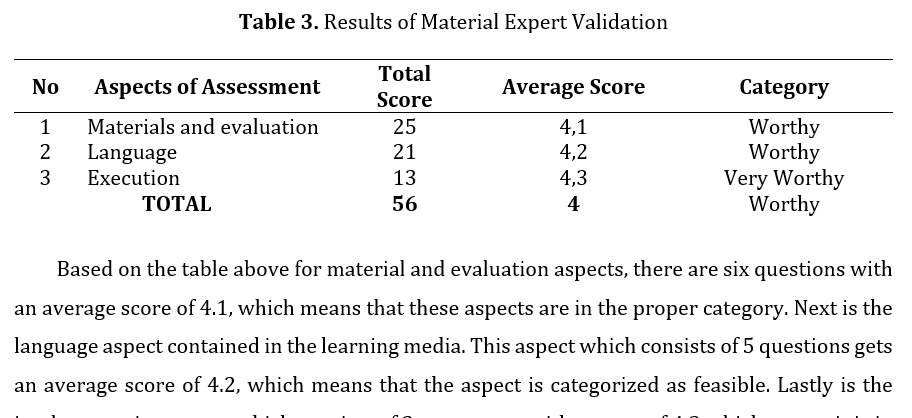Development of android-based learning media assisted by Thunkable Applications in literary history courses
DOI:
https://doi.org/10.26555/bs.v43i2.514Keywords:
Learning Media, History of Literature, Thunkable ApplicationsAbstract
The purpose of this study was to develop learning media for Android-based Literary History using thunkable applications in the independent learning-free campus era. This study applied the Research and Development method whose products were tested on students. Therefore media validation and material validation are needed before it is finally validated by the user. Research data collection uses a questionnaire so that it is known about the feasibility of the product in the form of thunkable application-assisted learning media. This study concluded that the total score of the combined validation questionnaire was 129 or 4.03 as the average. In other words, these results state the feasibility of android-based modern Indonesian literature learning media assisted by the thunkable application for use in teaching and learning activities in Literary History courses.
References
Banggur, M. D. V. (2020). Blended Learning: Solusi Pembelajaran Di Era Revolusi Industri 4.0.
Basilaia, G., & Kvavadze, D. (2020). Transition to online education in schools during a SARS-CoV-2 coronavirus (COVID-19) pandemic in Georgia. Pedagogical Research, 5(4), 1-9.
Borg and Gall, (1983). Educational Research, An Introduction., New York and London: Longman Inc
Chen, J., Qi, T., Liu, L., Ling, Y., Qian, Z., Li, T., & Song, Z. (2020). Clinical progression of patients with COVID-19 in Shanghai, China. Journal of Infection
Cole, R. S., & Todd, J. B. (2003). Effects of web-based multimedia homework with immediate rich feedback on student learning in general chemistry. Journal of Chemical Education, 80(11), 1338.
Fitriyani, Y., Fauzi, I., & Sari, M. (2020). Motivasi Belajar Mahasiswa Pada Pembelajaran Daring Selama Pandemik Covid-19. Jurnal Kependidikan: Jurnal Hasil Penelitian dan Kajian Kepustakaan di Bidang Pendidikan, Pengajaran dan Pembelajaran, 6(2), 165-175. doi:https://doi.org/10.33394/jk.v6i2.2654
Gunawan, G., Harjono, A., Sahidu, H., & Herayanti, L. (2017). Virtual laboratory to improve students' problem-solving skills on electricity concept. Jurnal Pendidikan IPA Indonesia, 6(2), 257-264.
Haslinda. 2017. Pengembangan Bahan Ajar Kajian Apresiasi Prosa Fiksi Berbasis Kearifan Lokal Makassar Terintegrasi Mobile Learning Mahasiswa FKIP Universitas Muhammadiyah Makassar. Disertasi. Universitas Muhammadiyah Makassar.
Herliandry, L. D., Nurhasanah, N., Suban, M. E., & Kuswanto, H. (2020). Pembelajaran Pada Masa Pandemi Covid-19. JTP-Jurnal Teknologi Pendidikan, 22(1), 65-70.
Hermanto, F., Nur, A., Nisa, S., & Nurhayati, S. (2022). Support Capacity and Student Online Learning Outcomes During The Covid 19 Pandemic.
Kamlaskar, C. H. (2007). Development and evaluation of an interactive multimedia simulation on electronics lab activity: Wien Bridge Oscillator. International Journal of Instructional Technology and Distance Learning, 4(3), 13-30.
Menrisal, & Utami, Nadiya Rizki. 2019 “Perancangan dan Pembuatan Media Pembelajaran Android Pada Mata Pelajaran Simulasi dan Komunikasi Digital (Studi Kasus Kelas X SMKN 7 Kerinci),” Media Infotama, Vol. 6, No. 1. Hal 1-11.
Muyaroah, S., & Fajartia, M. (2017). Pengembangan Media Pembelajaran Berbasis Android dengan menggunakan Aplikasi Adobe Flash CS 6 pada Mata Pelajaran Biologi. Innovative Journal of Curriculum and Educational Technology, 6(2), 22-26.
Nicola, M., Alsafi, Z., Sohrabi, C., Kerwan, A., Al-Jabir, A., Iosifidis, C., & Agha, R. (2020). The socio-economic implications of the coronavirus and COVID-19 pandemic: a review. International Journal of Surgery
Purwanto, A., Pramono, R., Asbari, M., Hyun, C. C., Wijayanti, L. M., & Putri, R. S. (2020). Studi Eksploratif Dampak Pandemi COVID-19 Terhadap Proses Pembelajaran Online di Sekolah Dasar. EduPsyCouns: Journal of Education, Psychology and Counseling, 2(1), 1-12.
Puspitaningrum, Asti Amalina, dkk. 2019.“Pengembangan Media Pembelajaran Berbasis Android Pada Materi Routing Statis,” Jurnal Ilmiah Edutic, Vol. 6, No. 1.
Putra, N. (2011). Research & Development. Jakarta: Raja Grafindo Persada.
Rahmawati, R., & Putri, E. M. I. (2020, June). Learning From Home dalam Perspektif Persepsi Mahasiswa Era Pandemi Covid-19. In Prosiding Seminar Nasional Hardiknas (Vol. 1, pp. 17-24).
Safitri, A., Yuliana, N., Alfian, A., Taradipa, E., & Aryani, A. S. (2020). The Effectiveness of Online Learning: The Implementation of Hand Hygiene as a COVID-19 Prevention of the Cognitive and Affective Capabilities of Nursing Students. Indonesian Journal of STEM Education, 2(1), 19-26.
Sugiyono. (2010). Metode penelitian kuantitatif, kualitatif dan R&D. Bandung: Alfabeta.
Tang, Y. M., Chen, P. C., Law, K. M. Y., Wu, C. H., Lau, Y. yip, Guan, J., He, D., & Ho, G. T. S. (2021). Comparative analysis of Student’s live online learning readiness during the coronavirus (COVID-19) pandemic in the higher education sector. Computers and Education, 168. https://doi.org/10.1016/j.compedu.2021.104211
Thiagarajan, Sivasailam., Semmel, Dorothy S. & Semmel Melvyn I. (1974). Instructional Development for Training Teacher of Exceptional Children. Minesota: Indiana University
Treve, M. (2021). What COVID-19 has introduced into education: challenges Facing Higher Education Institutions (HEIs). Higher Education Pedagogies, 6(1), 212–227. https://doi.org/10.1080/23752696.2021.1951616

Additional Files
Published
Issue
Section
License
Copyright (c) 2023 Fina Hiasa, Supadi Supadi, Emi Agustina , Meli Afrodita , Lazfihma Lazfihma, Nafri Yanti

This work is licensed under a Creative Commons Attribution-ShareAlike 4.0 International License.

1.jpg)



